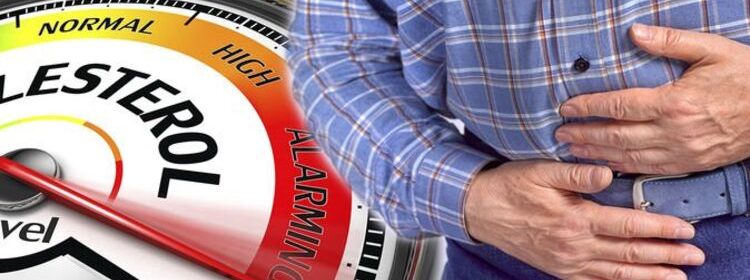High cholesterol: The sensation in your stomach warning of dangerously high levels

Dr Chris reveals how eyes can indicate high cholesterol levels
We use your sign-up to provide content in ways you’ve consented to and to improve our understanding of you. This may include adverts from us and 3rd parties based on our understanding. You can unsubscribe at any time. More info
Cholesterol itself isn’t bad. Your body needs some cholesterol to make hormones, vitamin D, and digestive fluids. Cholesterol also helps your organs function properly. Yet having too much LDL cholesterol can be a problem. High LDL cholesterol over time can damage your arteries, contribute to heart disease, and increase your risk for a stroke. Sensations felt in your stomach could indicate dangerously high levels.
The liver secretes cholesterol, which your bile normally dissolves, but if you produce an overabundance of cholesterol, the bile may not be able to break up all of it, and eventually stones could form.
Too much bilirubin produced by your liver during digestion could also cause gallstones.
According to Healthline, sudden abdominal pain is a symptom of gallstones.

In a study with BMJ cholesterol gallstones were further analysed.
The study noted: “Gallstones are a major public health problem in all developed countries.
“Many epidemiological studies have been performed with the aim of establishing gallstone prevalence and incidence rates, and of defining risk factors, amenable to prevention.
“Cholesterol gallstones constitute more than 80 percent of stones in the Western world.”
The study found three types of abnormalities being responsible for cholesterol gallstone formation.
The first being bile supersaturation in cholesterol.
The second abnormality is enhanced nucleation of cholesterol crystals.
“Mucin and its congeners, the major proteins, act as matrix molecules to hold cholesterol crystal aggregates together to form a stone.
“There also must be sufficient time for nucleation to occur, for crystals to form and grow to microliths, and for microliths to aggregate to form gallstones, hence gallbladder stasis is a contributing factor to gallstone formation.
“During overnight fasting, the gallbladder does not empty so that hours of storage occur in all individuals.
“It should be the sum of these three factors that determines when gallstones form.”

Fortunately changing what you eat, being more active, and stopping smoking can often help get your cholesterol back to a healthy level.
The NHS notes that there are two main types of fat, which are saturated and unsaturated. Eating too many foods high in saturated fat can raise the level of cholesterol in your blood.
The health body says most people in the UK eat too much saturated fat. If you’re aged 40 to 74, you can get your cholesterol checked as part of an NHS Health Check.
You can only find out if you have it from a blood test.
“Your GP might suggest having a test if they think your cholesterol level could be high,” explains the NHS.
“This may be because of your age, weight or another condition you have.”
Source: Read Full Article